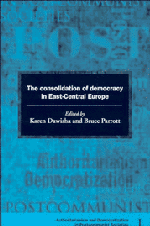Book contents
- Frontmatter
- Contents
- List of tables
- List of contributors
- Preface
- 1 Perspectives on postcommunist democratization
- 2 Democratization and political participation: research concepts and methodologies
- 3 Democratic consolidation in Poland after 1989
- 4 Party politics and political participation in postcommunist Hungary
- 5 Democratization and political participation: the experience of the Czech Republic
- 6 Democratization and political participation in Slovakia
- 7 Democratization and political participation in postcommunist societies: the case of Latvia
- 8 Democratization in Lithuania
- 9 Democratization and political development in Estonia, 1987–96
- Appendix
- Index
5 - Democratization and political participation: the experience of the Czech Republic
Published online by Cambridge University Press: 01 June 2011
- Frontmatter
- Contents
- List of tables
- List of contributors
- Preface
- 1 Perspectives on postcommunist democratization
- 2 Democratization and political participation: research concepts and methodologies
- 3 Democratic consolidation in Poland after 1989
- 4 Party politics and political participation in postcommunist Hungary
- 5 Democratization and political participation: the experience of the Czech Republic
- 6 Democratization and political participation in Slovakia
- 7 Democratization and political participation in postcommunist societies: the case of Latvia
- 8 Democratization in Lithuania
- 9 Democratization and political development in Estonia, 1987–96
- Appendix
- Index
Summary
The Czech Republic is an example of a postcommunist country well on its way toward a consolidated democratic political system. Building upon its democratic past in the interwar period, its postcommunist political and economic system closely follows a western democratic model. Not only does the Republic wish to “join Europe” in foreign policy and economic relations, it also seeks to become fully democratic in its internal life.
The sudden and unexpected dissolution of the Czech and Slovak Federation in 1993 did not disrupt the development of democracy, economic reform, or the new party system within the Czech Republic. Though the Czech Republic as an independent sovereign nation dates only from 1993, political developments within that Republic are a continuation of the “velvet revolution” and democratization process initiated within the Czechoslovakian Federation in 1989–90.
The Czech Republic would appear as one of the more stabilized and successful of the postcommunist states in both politics and economics. The major democratization developments within the Czech Republic include the rapid growth of a multiparty system, the slower growth of an interest group system, and the abrupt increase in parliamentary activity. In economics, rapid privatization in all retail and profitable industry sectors has been accompanied by continued state ownership of either unprofitable or critical sectors. The public, as measured through opinion polling, seems to have an accepting, if reserved, attitude toward these postcommunist changes.
- Type
- Chapter
- Information
- The Consolidation of Democracy in East-Central Europe , pp. 149 - 196Publisher: Cambridge University PressPrint publication year: 1997
- 4
- Cited by

